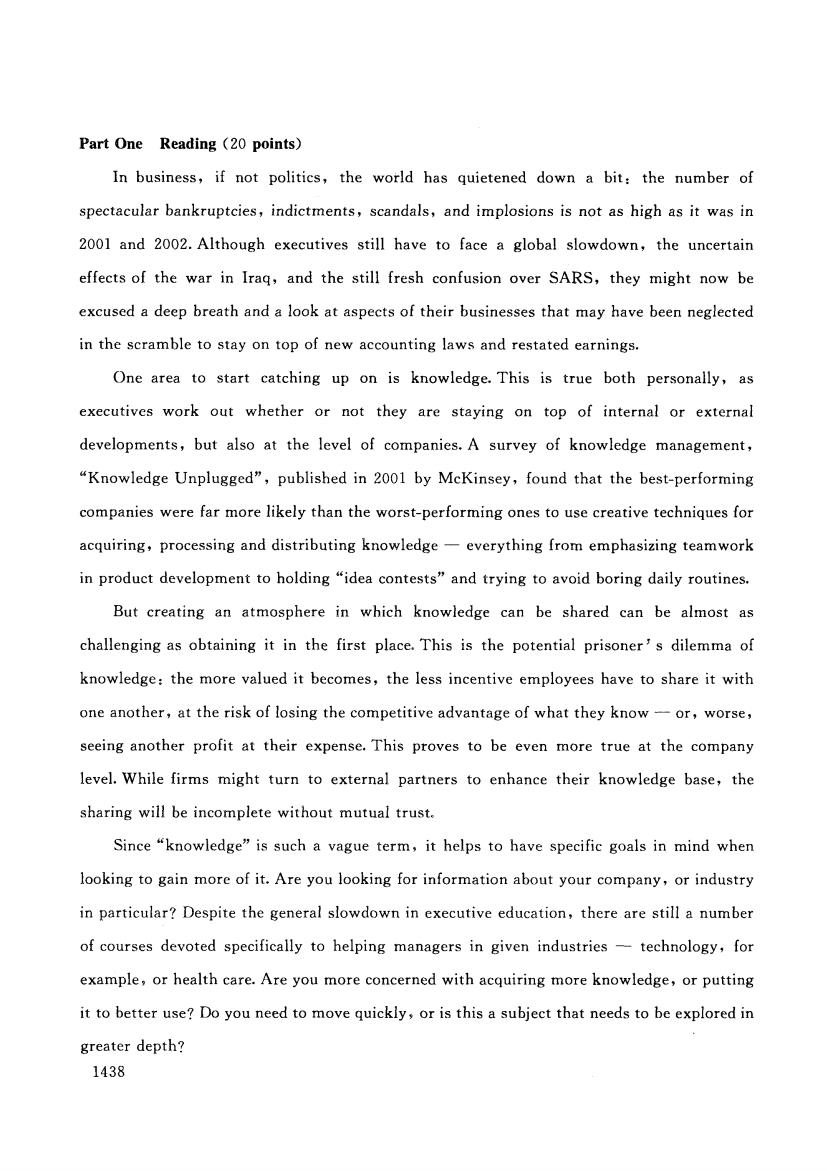正在加载图片...

Part One Reading (20 points) In business,if not politics,the world has quietened down a bit:the number of spectacular bankruptcies,indictments,scandals,and implosions is not as high as it was in 2001 and 2002.Although executives still have to face a global slowdown,the uncertain effects of the war in Iraq,and the still fresh confusion over SARS,they might now be excused a deep breath and a look at aspects of their businesses that may have been neglected in the scramble to stay on top of new accounting laws and restated earnings. One area to start catching up on is knowledge.This is true both personally,as executives work out whether or not they are staying on top of internal or external developments,but also at the level of companies.A survey of knowledge management, "Knowledge Unplugged",published in 2001 by McKinsey,found that the best-performing companies were far more likely than the worst-performing ones to use creative techniques for acquiring,processing and distributing knowledge-everything from emphasizing teamwork in product development to holding "idea contests"and trying to avoid boring daily routines. But creating an atmosphere in which knowledge can be shared can be almost as challenging as obtaining it in the first place.This is the potential prisoner's dilemma of knowledge:the more valued it becomes,the less incentive employees have to share it with one another,at the risk of losing the competitive advantage of what they know-or,worse, seeing another profit at their expense.This proves to be even more true at the company level.While firms might turn to external partners to enhance their knowledge base,the sharing will be incomplete without mutual trust. Since "knowledge"is such a vague term,it helps to have specific goals in mind when looking to gain more of it.Are you looking for information about your company,or industry in particular?Despite the general slowdown in executive education,there are still a number of courses devoted specifically to helping managers in given industries -technology,for example,or health care.Are you more concerned with acquiring more knowledge,or putting it to better use?Do you need to move quickly,or is this a subject that needs to be explored in greater depth? 1438Part One Reading (20 points) In business, if not politics, the world has quietened down a bit: the number of spectacular bankruptcies , indictments, scandals, and implosions is not as high as it was in 2001 and 2002. Although executives still have to face a global slowdown , the uncertain effects of the war in Iraq , and the still fresh confusion over SARS , they might now be excused a deep breath and a look at aspects of their businesses that may have been neglected in the scramble to stay on top of new accounting laws and restated earnings. One area to start catching up on is knowledge. This is true both personally , as executives work out whether or not they are staying on top of internal or external developments , but a1so at the 1eve1 of companies. A survey of know1edge management , "Know1edge Unplugged" , published in 2001 by McKinsey , found that the best-performing companies were far more like1y than the worst-performing ones to use creative techniques for acquiring , processing and distributing knowledge - everything from emphasizing teamwork in product development to holding "idea contests" and trying to avoid boring daily routines. But creating an atmosphere in which knowledge can be shared can be almost as challenging as obtaining it in the first place. This is the potentia1 prisoner 7 s dilemma of knowledge: the more va1ued it becomes, the 1ess incentive emp10yees have to share it with one another, at the risk of losing the competitive advantage of what they know or worse , seeing another profit at their expense. This proves to be even more true at the company level. While firms might turn to external partners to enhance their knowledge base , the sharing wiII be incomplete without mutual trust. Since "knowledge" is such a vague term , it helps to have specific goals in mind when looking to gain more of it. Are you looking for information about your company , or industry in particular? Despite the general slowdown in executive education , there are still a number of courses devoted specifically to helping managers in given industries - technology , for example , or health care. Are you more concerned with acquiring more knowledge , or putting it to better use? Do you need to move quickly , or is this a subject that needs to be explored in greater depth? 1438